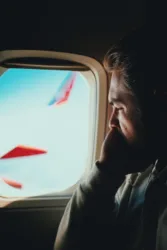
While vacations and traveling are stereotypical causes for excitement and thoughts of relaxation, these things can actually be severe sources of anxiety for some. Those who struggle with travel anxiety might find more ways to avoid taking a trip instead of actively seeking out time to travel.
Inevitably, though, most people have to travel at some point in their life. So what do you do when you have to fly? How do you cope with anxiety in a healthy, effective way?
What is travel anxiety?
Travel anxiety is exactly what it sounds like — anxiety in regard to travel. It’s not just a fear of flying, although that can be a part of it. Travel anxiety is a symptom of stress experienced when preparing for, and partaking in, travel.
Travel anxiety can be caused by various factors, such as:
- Hearing about a foreign illness and becoming fearful of contracting it
- Experiencing a car accident in the past and being hesitant about car travel as a result
- Hearing about traumatic news stories involving methods of traveling, including airplanes
- Concern about experiencing a panic attack while traveling
- Being physically removed from a familiar, comfortable environment and in a new, unfamiliar place for an extended period of time
These situations may cause travel anxiety to manifest in a variety of symptoms, including:
- Stomach pain, diarrhea and/or nausea
- Restlessness or agitation
- Irritability
- Sweating and/or shaking
- Difficulty falling and staying asleep
- Panic attacks
- Trouble focusing
- Faster heart rate
- More rapid or difficult breathing
- Chest pain and muscle tension
While not everyone will experience all these symptoms, and not every form of travel will cause the same level of stress, it’s helpful to have a greater understanding for the sake of being able to better cope with travel anxiety.
Ways to deal with travel anxiety
Just because you experience travel anxiety does not mean you have to endure it forever. There are plenty of travel tips you can utilize to minimize your anxiety, both before and during travel.
Try holistic therapies
Essential oils can be helpful in addressing motion sickness and invoking a sense of calm. Lavender is a soothing scent that can help a person relax, while peppermint can alleviate feelings of nausea. Ginger candies and supplements can address symptoms associated with motion sickness. Nausea can also be addressed with pressure points on the wrist.
Create a sense of safety
You may experience anxiety as a result of feeling unsafe. To increase your sense of safety, try:
- Having a first aid kit or emergency road kid to feel prepared in the event of an emergency
- Calling a friend or family member when you reach checkpoints on your trip (a layover or road trip stop) to let someone know where you’re at and that you’re safe
- Traveling with a buddy — not only is this more fun, but it can also provide you with security knowing you have another person to lean on when complications occur
Your sense of safety is a top priority, so make sure you take the time to do what you need ahead of time to create that safe environment for yourself, including how you’ll handle things when they don’t go according to plan.
Have a plan
Things don’t always go according to plan while traveling, as delays and complications do happen. But that shouldn’t keep you from going on a trip or vacation. If anything, let this knowledge fuel your own preparedness plan.
Plan for how you’re going to handle travel delays; know what you’re going to do to keep yourself relaxed on the airplane; keep supplies in the car to keep you entertained and distracted, or the necessary items to help you take a long nap to sleep the trip away.
Settle things at home
Some find it incredibly stressful to leave behind their pets, children or home while traveling. To ease your mind, entrust your pets to the care of a close friend, or board them at your veterinary clinic or kennel; see if your kids can stay with family friends or grandparents for the week; have someone you trust to check in on your home on a daily basis, asking them to bring in the mail and water the plants if needed.
Knowing that someone is keeping a close eye on your belongings or family can help ease your mind and allow you to relax while traveling.
Bring distractions
Keeping yourself distracted is a helpful way to cope with travel stress. Download a new show, game or movie on your phone to focus your mind on something else, as well as help pass the time in a healthy way.
Additionally, bring an adult coloring book, magazines or a novel to distract you. Perhaps you have a job you can work on remotely — even sending emails or working on a project can offer a sense of routine and productive concentration to your travel day.
Additional support for life’s challenges
Traveling is just one potential source of anxiety — there are numerous other moments in our lives that can potentially cause stress. Learning to manage these situations will not only strengthen you to take on the unexpected but may increase your sense of internal peace overall. Working with a therapist can give you the tools you need when you can’t seem to handle life’s challenges on your own.
To get in touch with a therapist today, reach out to The Light Program by calling 610-644-6464 or visiting our website to learn more.





